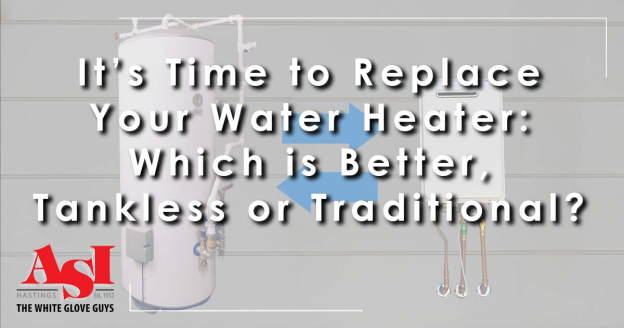A new water heater for your home will be an investment on something you use for years to come. It’s important to consider the pros and cons of each type to find which will be the best fit for your needs.
Here will let you know everything you need to know about the benefits and negatives of both tankless and traditional water heaters.
What’s The Difference Between a Tankless and A Traditional Water Heater?
There are many differences between traditional and tankless water heaters that can have an impact on your hot water. Knowing exactly how both kinds of water heaters perform will help you to pick which one will best fit your needs and ensure you’ll receive the best water temperature when you need it.
Traditional water heaters have a large water that stores and pre-heats 30-50 gallons of water at a time. Once you’ve used all that hot water it will refill and preheat an additional 30-50 gallons. It will repeat this cycle as needed.
Tankless water heaters don’t store any water because they don’t have a storage tank. Instead of pre-heating water, they will use electricity or gas to heat water on an as-needed basis.
As with all appliances, before you buy you should know the pros and cons of each. Below we will go over the best and worst of each of these types of water heaters.
Tankless Water Heaters
Pros
- Hot Water On-Demand. Since this water heater heats as you use the water, you can be sure that your hot water won’t run out while you’re actively using it.
- Budget Friendly. These water heaters can help save you money on your energy bill. This is great if you live in an area that has higher energy costs.
- Great for Small Homes. An ideal option for your home if you’re trying to maximize space or free up space. This is because they don’t have any storage tanks and can fit into smaller areas.
- Energy Efficient. Due to the water not being constantly heated these water heaters use up less energy. They have been found to be 24%-34% more energy efficient than traditional heaters as long as you use up to 41 gallons of water a day.
Cons
- Can Be Restrictive.If you’re wanting to run multiple appliances at a time, such as your washing machine, dishwasher, and shower, then you will most likely see fluctuations in the amount of hot water. This is due to the fact that these water heaters can only heat a certain amount of water at one time. This might be avoided if you have an additional unit installed or if less water is used.
- Reliant on Electricity.Even if your unit is gas-powered, electricity is still needed to heat the water. This can be a headache if there is a power outage and you’re not able to receive hot water. If your area is prone to power outages a traditional water heater may be best.
- Unit Cost & Upfront Cost.Because the installation is a little more complicated for a tankless water heater as opposed to a traditional unit, the upfront cost is higher. For electrical units, you can expect to pay $500-$1,500 and for propane and gas units you may pay between $1,000-$1,500. But even though the start-up costs are higher, they use less energy which will save you money in the long run.
Traditional Water Heater
Pros
- Easy Replacement.These are the more common water heaters used in homes so replacing and maintaining them is much easier for plumbers.
- Increased Hot Water Flow.Because these types of water heaters have a large water storage tank they will always have hot water ready. It can also handle putting hot water out to multiple appliances at the same time
- Lower Installation Cost.Your home is already equipped with all of the plumbing needed for the installation of these water heaters. This will result in the installation cost being about half as much as a tank water heater installation.
Cons
- Short Lifespan. These water heaters tend to last only 10-15 years as opposed to a tankless water heater that has a much longer lifespan.
- Can Be Big and Bulky. Due to the large and bulky water storage tank, these units take up a lot more space. On top of that, they have to be placed under a covered area. If your home is small this may not be ideal.
- Higher Energy Usage.This water heater will always be heating the water to the pre-set thermostat setting so it will use up a lot more energy by always running.
Now that you’ve learned about the pros and cons of each type of water heater you should have a better idea of which will be best for your home. Keep these lists in mind when you are shopping for your new water heater.
The ASI team is here to help you make the decision on what kind of water heater is best and help with the installation. Give us a call today for a consultation!











